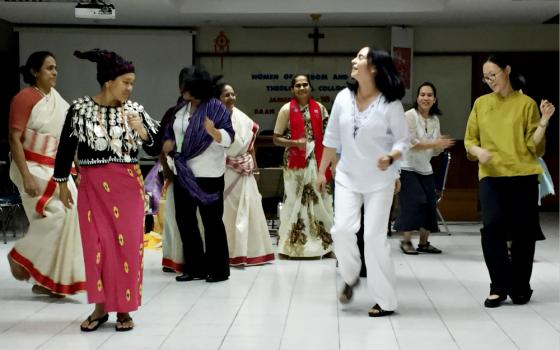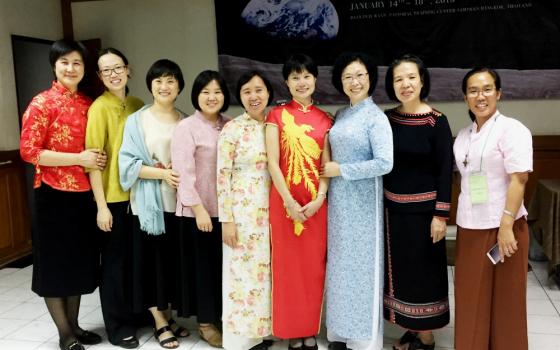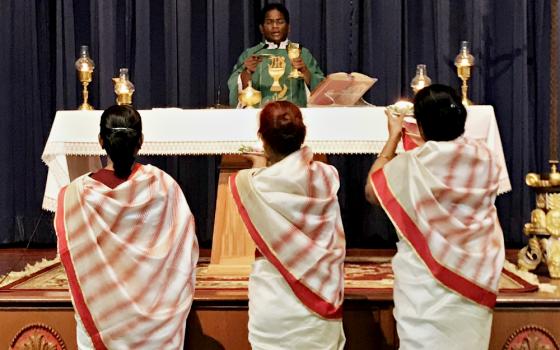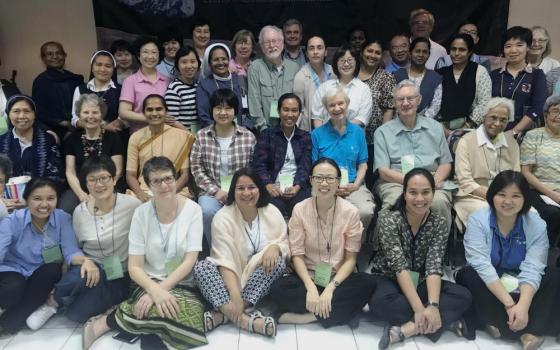We need young female theologians if women's voices are to carry on the legacy of those women who began the work of breaking through patriarchal theological barriers and to continue contributing to the theological development of our Catholic Church!
This is the goal of Women of Wisdom and Action, which began seven years ago as a collaboration of the U.S. province of the Verbum Dei Missionary Fraternity and the Jesuit School of Theology at Santa Clara University, particularly for women religious of Asia. (The program is sponsored by the Conrad N. Hilton Foundation, which also funds Global Sisters Report.)
I had the wonderful fortune to participate in the fruits of this initiative Jan. 14-18 in Bangkok. A colloquium, "Without a Vision, the People Will Perish," gave opportunity for female Asian theologians to share with one another theological insights from their studies.
Thirty-one sisters, three laywomen, a layman and six Jesuit priests* from the United States and seven Asian countries gathered to keep alive the vision and passion that Women of Wisdom and Action has engendered since its founding and to reflect on how to sustain its momentum for the future.
For four days, the sisters — 12 from China, seven from India, four from Vietnam, three from Myanmar, two from the Philippines, one from Taiwan, one from Singapore, one Korean-American, and two doctoral candidates from tribal communities in India — participated in panel presentations joined by former mentors or teachers from the universities at which they studied. A group of nine sisters held a discussion of theological issues that arise in spiritual direction. Papers reflected research, prayer and study on themes in Old and New Testaments, the church in the world and feminist theologies. After each panel, groups organized according to age to raise important perspectives on questions that emerged from the presentations.
Discussions raised points about the importance of nurturing critical thinking and questioning skills that keep theology alive and reminded us all that theological thought needs to be holistic and contextual. The scholars also agreed that dialogue helps develop theology; thus, communities of theological thinking are necessary today.
There was also agreement about the importance of language in theological discourse. We discussed how cultural language can create narratives about our lives as women and consequently as women religious that in turn influence our images of God in today's cultural contexts.
One example given was from Vietnamese culture, where Thi, meaning "pregnant," is the middle name for all women, whereas the middle name for all men is Van, which means "men with high education." Another example from Vietnam but originally from China is their word for women, phu nu, which means "modest" or "subordinate to men." These words remain with Vietnamese women when they enter into religious life and have influenced the way they are regarded in the church.
An example of a positive alternative narrative about women in theology was noted in answering the question, "Who is a theologian?" Rather than giving in to the patriarchal narrative that only priests or those women and men with theology doctorates can hold this role, women who have bachelor's or master's degrees in theology can also claim the title in ministries of teaching social work, administration or others.
The panel presentations included both academic and practical theologians. Some are clearly more attracted to deep research and writing while others feel called to practice theological perspectives in their ministerial lives. Both make important contributions to theological life.
This was apparent in papers that reflected on ministries with refugees and displaced persons fleeing from the violence of war that elicited deep feelings of sorrow in presenters and listeners. They reminded us that theology without heart is not holistic.
Feminist presenters reflected on the suffering of women living out subservient images and roles in families and the church in Asia that frequently lead to domestic and sexual violence that they carry in shame for years, unable to voice it outwardly.
Although well-trained in spiritual direction skills, sisters shared that priests, laity and even other sisters judge that they are stepping into roles that belong only to priests. However, those courageous enough to carry on find that women willing to engage them as spiritual directors are freer to let go of years of excruciating silence about the shame of abuse and begin transformation in how they feel about themselves.
Returning to their congregations after years of being away for theological studies has been painful for a number of the sisters. They shared openly of being plagued with fears about rejection and being misunderstood, disoriented and not "fitting in" because of what they have learned, even if their congregational leaders chose them to go for studies.
They wondered if theology had empowered them or enslaved them. Yes, they learned many new things by studying theology, but upon return, superiors and, in some cases, bishops assigned them to heavy ministry situations that prevented them from doing the research and writing needed for our church today.
They said they feel disoriented, caught between responding to the needs of their congregations for formation of new sisters or other works and the need for women in the church to engage in serious theological work. They said they fear losing the skills gained through their years of study and need support to keep up their courage to resist giving up the dreams of theological study and discourse.
These concerns led to discussions about the need to foster relationships and form networks of other female theologians to keep alive the passion for the work, support and challenge to keep writing.
The group spent the last day of the colloquium in prayer and reflection on the way forward for this Asian women's theological initiative. The past seven years were possible with funding from foundations and donations. If this is no longer possible, they wondered how the passion and support would be kept alive.
Consensus confirmed that commitment of each person present to the visionary dream is most important, along with the need for local leadership, for, as the colloquium's theme states, "Without a vision, the people will perish." Developing and sustaining regional networks is a practical way forward, but another aspect is the need for an international body to facilitate fundraising and communication among the regions and to organize international gatherings every four or five years. The original Women of Wisdom and Action team will take responsibility to explore how these ideas might be implemented.
As it happened, two other gatherings of theologians were happening next door to the Women of Wisdom and Action colloquium: one gathering for members of the Office of Theological Concerns of the Federation of Asian Bishops' Conferences, and another for the presidents of the Doctrinal Commissions of the Episcopal Conferences of Asia and a delegation from the Vatican Congregation for the Doctrine of the Faith.
A brief address to the colloquium by Cardinal Luis Ladaria, prefect of the doctrinal congregation, was characterized by gratitude, joy and encouragement. It was the only official interaction between the groups, but paths crossed, especially at meals and during walks around campus.
Many bishops were intrigued by the number of sisters gathered for theological work and subsequently involved sisters in conversations at meals and in the hallways. Several already had been in contact with Women of Wisdom and Action over the years — like Cardinal Charles Bo of Yangon, Myanmar, president of the Federation of Asian Bishops' Conferences — and were delighted to meet again. Some had been in theological training with sisters at the colloquium or knew each other from close proximity in place of origin or in shared ministries.
Each day, our theological program began with beautiful cultural liturgies and prayer. We enjoyed an evening of cultural dancing and song. I left the colloquium filled with joy and optimism for the future of women in theology. I met some brilliant women, and my commitment is to pray that what has begun will continue to flourish.
*An earlier version of this blog post gave an incorrect number of priests.
[Joyce Meyer is a member of the Sisters of the Presentation of the Blessed Virgin Mary and is GSR's liaison to women religious outside of the United States.]




